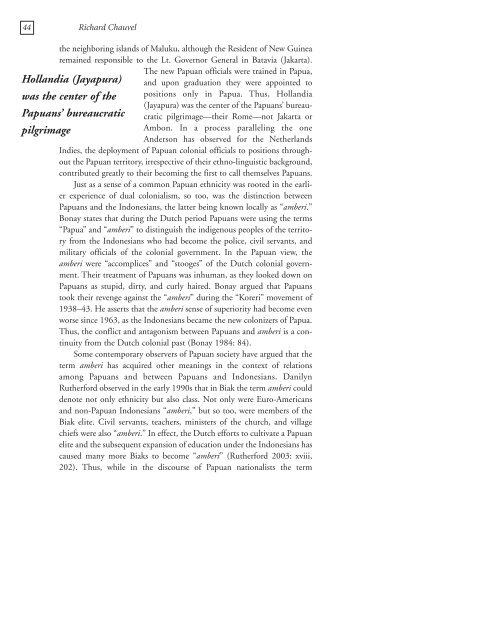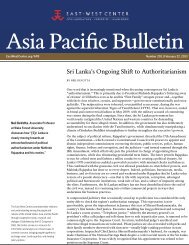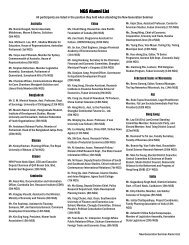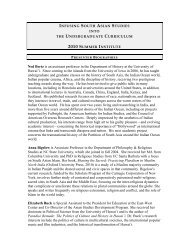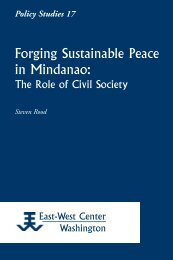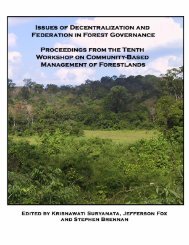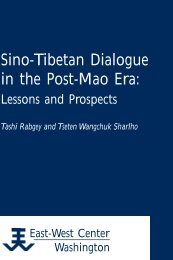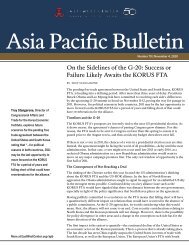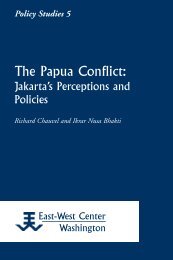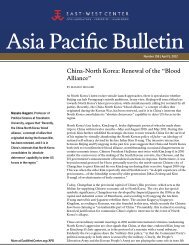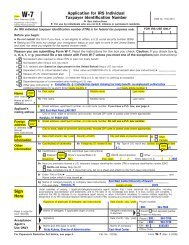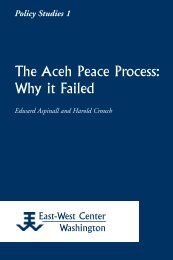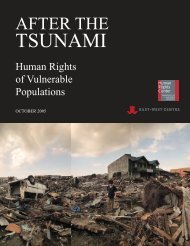Constructing Papuan Nationalism: History, Ethnicity ... - ScholarSpace
Constructing Papuan Nationalism: History, Ethnicity ... - ScholarSpace
Constructing Papuan Nationalism: History, Ethnicity ... - ScholarSpace
- No tags were found...
Create successful ePaper yourself
Turn your PDF publications into a flip-book with our unique Google optimized e-Paper software.
44 Richard Chauvelthe neighboring islands of Maluku, although the Resident of New Guinearemained responsible to the Lt. Governor General in Batavia (Jakarta).The new <strong>Papuan</strong> officials were trained in Papua,and upon graduation they were appointed topositions only in Papua. Thus, Hollandia(Jayapura) was the center of the <strong>Papuan</strong>s’ bureaucraticpilgrimage—their Rome—not Jakarta orAmbon. In a process paralleling the oneAnderson has observed for the NetherlandsIndies, the deployment of <strong>Papuan</strong> colonial officials to positions throughoutthe <strong>Papuan</strong> territory, irrespective of their ethno-linguistic background,contributed greatly to their becoming the first to call themselves <strong>Papuan</strong>s.Just as a sense of a common <strong>Papuan</strong> ethnicity was rooted in the earlierexperience of dual colonialism, so too, was the distinction between<strong>Papuan</strong>s and the Indonesians, the latter being known locally as “amberi.”Bonay states that during the Dutch period <strong>Papuan</strong>s were using the terms“Papua” and “amberi” to distinguish the indigenous peoples of the territoryfrom the Indonesians who had become the police, civil servants, andmilitary officials of the colonial government. In the <strong>Papuan</strong> view, theamberi were “accomplices” and “stooges” of the Dutch colonial government.Their treatment of <strong>Papuan</strong>s was inhuman, as they looked down on<strong>Papuan</strong>s as stupid, dirty, and curly haired. Bonay argued that <strong>Papuan</strong>stook their revenge against the “amberi” during the “Koreri” movement of1938–43. He asserts that the amberi sense of superiority had become evenworse since 1963, as the Indonesians became the new colonizers of Papua.Thus, the conflict and antagonism between <strong>Papuan</strong>s and amberi is a continuityfrom the Dutch colonial past (Bonay 1984: 84).Some contemporary observers of <strong>Papuan</strong> society have argued that theterm amberi has acquired other meanings in the context of relationsamong <strong>Papuan</strong>s and between <strong>Papuan</strong>s and Indonesians. DanilynRutherford observed in the early 1990s that in Biak the term amberi coulddenote not only ethnicity but also class. Not only were Euro-Americansand non-<strong>Papuan</strong> Indonesians “amberi,” but so too, were members of theBiak elite. Civil servants, teachers, ministers of the church, and villagechiefs were also “amberi.” In effect, the Dutch efforts to cultivate a <strong>Papuan</strong>elite and the subsequent expansion of education under the Indonesians hascaused many more Biaks to become “amberi” (Rutherford 2003: xviii,202). Thus, while in the discourse of <strong>Papuan</strong> nationalists the termHollandia (Jayapura)was the center of the<strong>Papuan</strong>s’ bureaucraticpilgrimage


